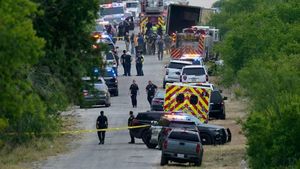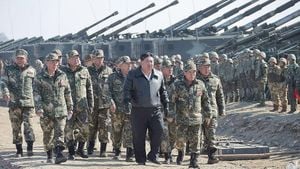The United Nations Office for the Coordination of Humanitarian Affairs (OCHA) delivered heart-wrenching news from Geneva, announcing 2024 as the deadliest year for humanitarian workers on record. A staggering 281 aid personnel have lost their lives worldwide due to violence stemming from conflicts, surpassing all previous years. This harrowing figure reflects not only the dangers faced by aid workers but also signals deepening global instability.
According to OCHA, the year 2024 has seen the number of fatalities escalate alarmingly. The increase from 280 deaths reported just last year highlights the urgent need for protective measures for those dedicated to humanitarian efforts. OCHA has pointed to the intensifying conflict in Gaza, which has disproportionately affected humanitarian operations.
Since the onset of hostilities on October 7, 2023, Gaza has become one of the most perilous environments for aid workers, where at least 320 have already been killed. A significant portion of these workers were affiliated with the United Nations Relief and Works Agency for Palestine Refugees in the Near East (UNRWA), emphasizing the desperate need for aid within this besieged region.
But the violence doesn't stop at Gaza's borders. The report indicts several nations, including Afghanistan, the Democratic Republic of the Congo, Sudan, South Sudan, Yemen, and Ukraine, as similarly treacherous locales for humanitarian operations. Aid workers here face not only violence but also harassment, kidnappings, and arbitrary detentions, showing just how widespread the threats to humanitarian efforts are.
Last year was already alarmingly violent, with over 33,000 civilian deaths noted across 14 different armed conflicts — a shocking 72% rise compared to 2022. This broader trend indicates more than just danger for aid workers; it reflects the deteriorated safety of civilians and humanitarian access across conflict zones.
Local staff employed by various organizations including non-governmental organizations (NGOs), UN agencies, and the Red Cross/Red Crescent Movement have borne the brunt of this uptick in violence. They often find themselves amid armed confrontations, struggling to provide assistance amid the chaos. Humanitarian operations remain critically important yet exceedingly dangerous.
Despite the tragic circumstances, humanitarian organizations persist in their mission. OCHA has reported these organizations have reached nearly 144 million people globally to deliver lifesaving assistance last year. So far this year, they have already supported over 116 million individuals worldwide. The commitment displayed by these workers is commendable, operating under conditions many would deem intolerable.
Recognizing the growing trend of violence against aid workers, the UN Security Council passed Resolution 2730 on May 24, 2024. This measure aims to bolster protections for humanitarian personnel and assets, also mandading the Secretary-General to recommend specific actions to prevent such violence. With the unfortunate situation signaling no clear respite, the measures proposed will undergo scrutiny at the Security Council's upcoming meeting on November 26.
Tom Fletcher, Under-Secretary-General for Humanitarian Affairs and Emergency Relief Coordinator, has been vocal about the shocking realities faced by humanitarian workers. He strongly asserted, "Humanitarian workers are being killed at an unprecedented rate, their courage and humanity being met with bullets and bombs. This violence is unconscionable and devastating to aid operations. States and parties to conflict must protect humanitarians, uphold international law, prosecute those responsible, and call time on this era of impunity."
The global community must take notice. The rising fatalities and widespread violence against humanitarian personnel indicate not just the risks faced by aid workers but also the broader societal collapse evident in conflict-hit nations. The hope is for strengthened international responses and protection measures to preserve humanitarian missions and support the vulnerable populations reliant on aid workers' courage.



